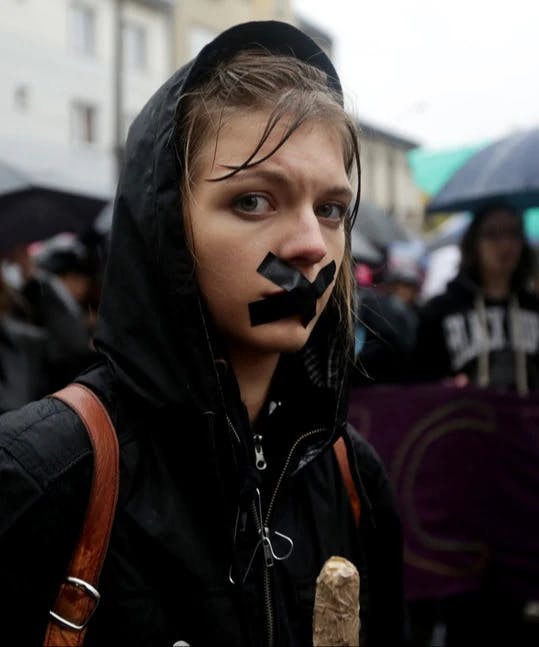Why Some People Are Silent On “Black Lives Matter”
Every day, more companies, institutions, organizations, churches, and individuals are signaling support for the “Black Lives Matter” movement. Often, the statements are a response to social pressure.

During Blackout Tuesday, for example, I remember several women I know quietly asking the question, “If I don’t post the black square on Instagram, will my friends think I’m racist?”
Organizational leaders are sensing the same compulsion. If they don’t speak up in the wake of the Black Lives Matter movement — even though they’ve promoted good racial policies in the past, or perhaps never commented on politics before — they’ll be accused of malicious “silence.”
Doesn’t Silence Mean You’re Condoning Racism?
The problem is, Black Lives Matter as a movement encompasses a whole lot more than black lives.
In a 2015 video, BLM co-founder Patrisse Cullors asserted that she and other BLM leaders are “trained Marxists.” On racial issues, Cullors aligns herself with far-left positions, like prison abolition and reparations in the form of financial compensation and land redistribution.
In 2015, BLM co-founder Patrisse Cullors asserted that she and other BLM leaders are “trained Marxists.”
On other political issues, it’s a similar story. Cullors supports the Boycott, Divest, Sanctions movement, for example, which pushes to end Israel’s occupation of Palestinian territories, and which the U.S. House resolved to oppose in a 398-17 vote in 2019. On one occasion, another BLM leader spoke at an event honoring Venezuelan dictator Nicholas Maduro. BLM leaders have also worked in abortion and immigration activism.
Additionally, BLM’s website officially espouses a plethora of controversial goals: it aims to “dismantle cisgender privilege,” “uplift Black trans folk,” and “disrupt the Western-prescribed nuclear family structure requirement by supporting each other as extended families and ‘villages’ that collectively care for one another, especially our children.” BLM also says it disregards “immigration status,” and that it desires to “foster a queer-affirming network.”
BLM Fails To Rally Americans around a Single Solution
In addition to highlighting large ideological divides among Americans that are unrelated to racial issues, BLM promotes solutions to racial problems that most people don’t support. According to a recent POLITICO/Morning Consult poll, only 29% of voters support the movement to “Defund the Police,” for example.
Only 29% of voters support the movement to “Defund the Police.”
The poll also shows that 59% of voters say police departments need either a complete overhaul or major reforms. But even those voters don’t share much in common, because everyone has a different idea of what police reform should look like.
BLM also alienates many potential supporters by condoning physical violence — i.e. trashing businesses and tearing down city monuments. My own city’s downtown is now full of boarded-up buildings, spray-painted store-fronts, police tape, and statue-less pedestals.
This Is Not a Character Test
Despite the many legitimate reasons to oppose the BLM movement, some people are treating each individual's response to this movement like a test of their character, which is just not what this is. The virtue of those who denounce racism on Instagram today is nowhere near the virtue of those who stood up against it when it was unpopular or could even get you killed.
Some people are treating each individual's response to this movement like a test of their character, which is just not what this is.
I recently read a biography of Dietrich Bonhoeffer, a Lutheran pastor who was one of the very few Christian leaders in Germany to stand up against Nazi oppression during World War II. He helped several Jews escape the Nazi regime and was eventually hanged at a concentration camp. Many people now remember his famous statement, "Silence in the face of evil is itself evil: God will not hold us guiltless. Not to speak is to speak. Not to act is to act."
Today, many people are exhorting their fellow Americans the same way. They draw parallels to what abolitionists did in the 1800s or what Civil Rights activists did in the 1900s, acting as though refusal to support the current movement is a horrific evil, and that God will not hold the silent guiltless.
We Shouldn’t Pressure People To Conform
The truth is, we live in a very different era than the abolitionists and the Civil Rights activists did. In their day, it was clear what protesters were fighting for, i.e. the ending of slavery or the dismantling of the Jim Crow laws. Today, we can’t even agree on what our racial problems are, much less the solutions to those problems.
We shouldn’t pressure anyone to lend credibility to an extremist movement that wants to fundamentally dismantle society.
As a result, we can’t expect someone to “speak up” if they don’t even know what they’re speaking up for. On top of that, we shouldn’t pressure anyone to lend credibility to an extremist movement that wants to fundamentally dismantle society as we know it, and call people “racists” if they don’t comply.
Closing Thoughts
For the woman who wants to decorate her Instagram with #BlackLivesMatter, there’s nothing inherently wrong with that. But she should also realize that many people won’t know what she means by the statement “black lives matter.” They’ll probably assume she supports the broader BLM movement to some degree — which she may or may not intend to imply.
For the woman who chooses to stay silent, it’s not because she’s racist or doesn’t care about how historical oppression is reflected in the present era. It’s because she wants to support only the organizations and solutions she truly feels will uplift black people and the nation as a whole.